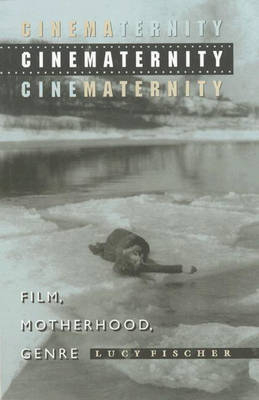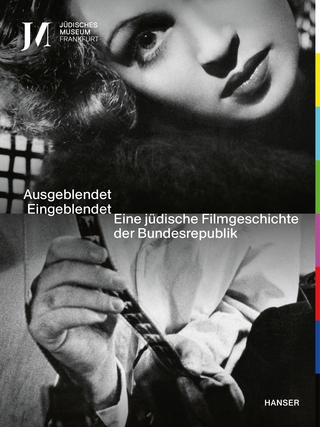
Cinematernity
Film, Motherhood, Genre
Seiten
1996
Princeton University Press (Verlag)
978-0-691-03774-5 (ISBN)
Princeton University Press (Verlag)
978-0-691-03774-5 (ISBN)
- Titel ist leider vergriffen;
keine Neuauflage - Artikel merken
Noting that motherhood is a common metaphor for film production, this book investigates how the motherhood topic presents itself throughout a wide range of film genres, showing the tendency of certain genres to specialize in representing a particular social or psychological dimension of motherhood.
Noting that motherhood is a common metaphor for film production, Lucy Fischer undertakes the first investigation of how the topic of motherhood presents itself throughout a wide range of film genres. Until now discussions of maternity have focused mainly on melodramas, which, along with musicals and screwball comedies, have traditionally been viewed as "women's" cinema. Fischer defies gender-based classifications to show how motherhood has played a fundamental role in the overall cinematic experience. She argues that motherhood is often treated as a site of crisis--for example, the mother being blamed for the ills afflicting her offspring--then shows the tendency of certain genres to specialize in representing a particular social or psychological dimension in the thematics of maternity.
Drawing on social history and various cultural theories, Fischer first looks at Rosemary's Baby to show the prevalence of childbirth themes in horror films. In crime films (White Heat), she sees the linkage of male deviance and mothering. The Hand That Rocks the Cradle and The Guardian, both occult thrillers, uncover cultural anxieties about working mothers. Her discussion covers burlesques of male mothering, feminist documentaries on the mother-daughter relationship, trick films dealing with procreative metaphors, and postmodern films like High Heels, where fluid sexuality is the theme. These films tend to treat motherhood as a locus of irredeemable conflict, whereas History and Memory and High Tide propose a more sanguine, dynamic, and enabling view.
Originally published in 1996.
The Princeton Legacy Library uses the latest print-on-demand technology to again make available previously out-of-print books from the distinguished backlist of Princeton University Press. These editions preserve the original texts of these important books while presenting them in durable paperback and hardcover editions. The goal of the Princeton Legacy Library is to vastly increase access to the rich scholarly heritage found in the thousands of books published by Princeton University Press since its founding in 1905.
Noting that motherhood is a common metaphor for film production, Lucy Fischer undertakes the first investigation of how the topic of motherhood presents itself throughout a wide range of film genres. Until now discussions of maternity have focused mainly on melodramas, which, along with musicals and screwball comedies, have traditionally been viewed as "women's" cinema. Fischer defies gender-based classifications to show how motherhood has played a fundamental role in the overall cinematic experience. She argues that motherhood is often treated as a site of crisis--for example, the mother being blamed for the ills afflicting her offspring--then shows the tendency of certain genres to specialize in representing a particular social or psychological dimension in the thematics of maternity.
Drawing on social history and various cultural theories, Fischer first looks at Rosemary's Baby to show the prevalence of childbirth themes in horror films. In crime films (White Heat), she sees the linkage of male deviance and mothering. The Hand That Rocks the Cradle and The Guardian, both occult thrillers, uncover cultural anxieties about working mothers. Her discussion covers burlesques of male mothering, feminist documentaries on the mother-daughter relationship, trick films dealing with procreative metaphors, and postmodern films like High Heels, where fluid sexuality is the theme. These films tend to treat motherhood as a locus of irredeemable conflict, whereas History and Memory and High Tide propose a more sanguine, dynamic, and enabling view.
Originally published in 1996.
The Princeton Legacy Library uses the latest print-on-demand technology to again make available previously out-of-print books from the distinguished backlist of Princeton University Press. These editions preserve the original texts of these important books while presenting them in durable paperback and hardcover editions. The goal of the Princeton Legacy Library is to vastly increase access to the rich scholarly heritage found in the thousands of books published by Princeton University Press since its founding in 1905.
| Reihe/Serie | Princeton Legacy Library |
|---|---|
| Zusatzinfo | 29 halftones |
| Verlagsort | New Jersey |
| Sprache | englisch |
| Maße | 197 x 254 mm |
| Gewicht | 397 g |
| Themenwelt | Kunst / Musik / Theater ► Film / TV |
| Sozialwissenschaften ► Kommunikation / Medien ► Medienwissenschaft | |
| Sozialwissenschaften ► Soziologie ► Gender Studies | |
| ISBN-10 | 0-691-03774-4 / 0691037744 |
| ISBN-13 | 978-0-691-03774-5 / 9780691037745 |
| Zustand | Neuware |
| Haben Sie eine Frage zum Produkt? |
Mehr entdecken
aus dem Bereich
aus dem Bereich
wie KI und virtuelle Welten von uns Besitz ergreifen – und die …
Buch | Hardcover (2023)
Heyne (Verlag)
22,00 €
eine jüdische Filmgeschichte der Bundesrepublik
Buch | Hardcover (2023)
Hanser (Verlag)
28,00 €


